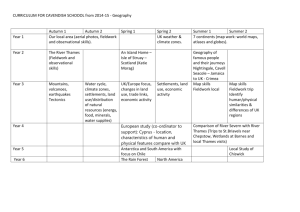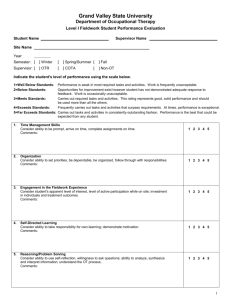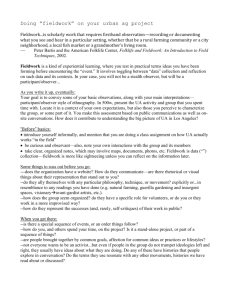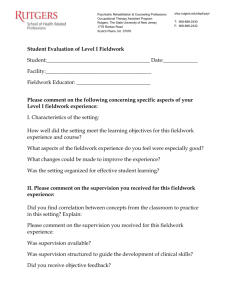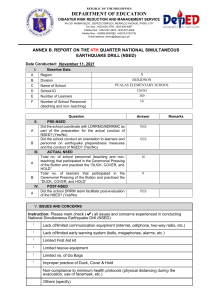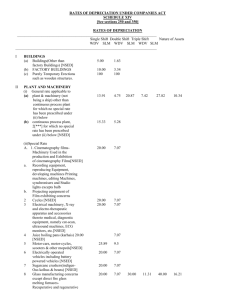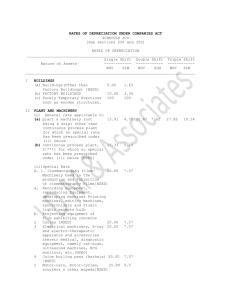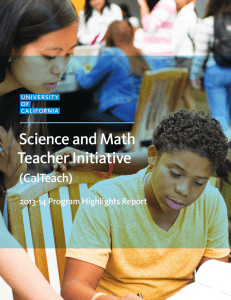Microsoft Word - SYLLABUSspring2011
advertisement
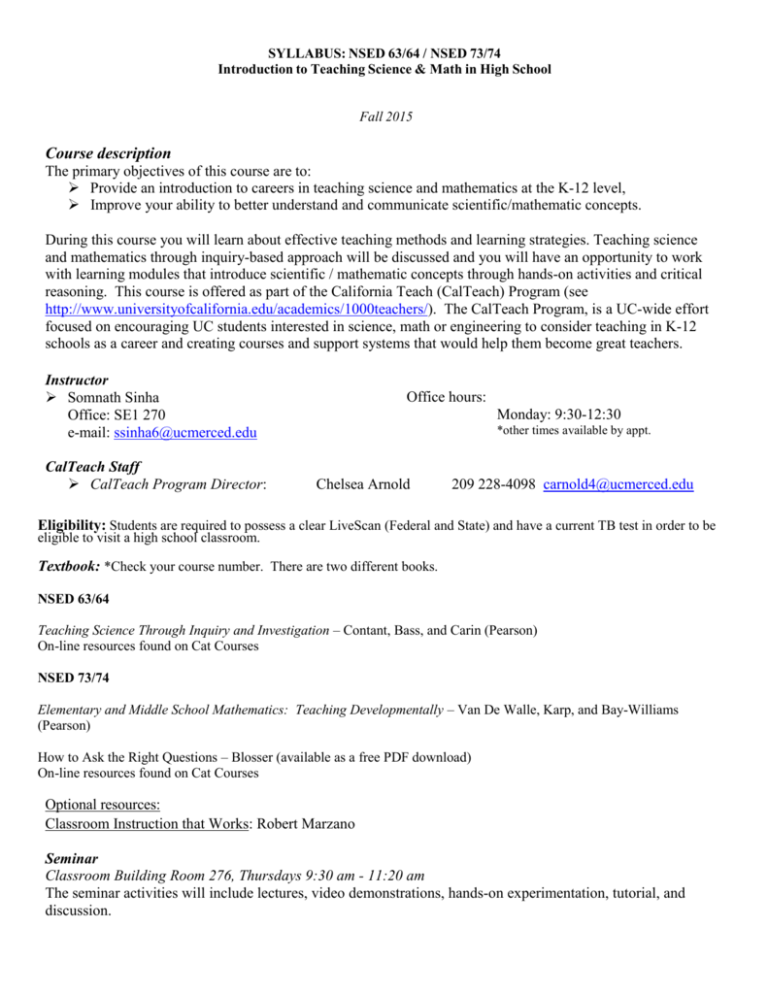
SYLLABUS: NSED 63/64 / NSED 73/74 Introduction to Teaching Science & Math in High School Fall 2015 Course description The primary objectives of this course are to: Provide an introduction to careers in teaching science and mathematics at the K-12 level, Improve your ability to better understand and communicate scientific/mathematic concepts. During this course you will learn about effective teaching methods and learning strategies. Teaching science and mathematics through inquiry-based approach will be discussed and you will have an opportunity to work with learning modules that introduce scientific / mathematic concepts through hands-on activities and critical reasoning. This course is offered as part of the California Teach (CalTeach) Program (see http://www.universityofcalifornia.edu/academics/1000teachers/). The CalTeach Program, is a UC-wide effort focused on encouraging UC students interested in science, math or engineering to consider teaching in K-12 schools as a career and creating courses and support systems that would help them become great teachers. Instructor Somnath Sinha Office: SE1 270 e-mail: ssinha6@ucmerced.edu CalTeach Staff CalTeach Program Director: Office hours: Monday: 9:30-12:30 *other times available by appt. Chelsea Arnold 209 228-4098 carnold4@ucmerced.edu Eligibility: Students are required to possess a clear LiveScan (Federal and State) and have a current TB test in order to be eligible to visit a high school classroom. Textbook: *Check your course number. There are two different books. NSED 63/64 Teaching Science Through Inquiry and Investigation – Contant, Bass, and Carin (Pearson) On-line resources found on Cat Courses NSED 73/74 Elementary and Middle School Mathematics: Teaching Developmentally – Van De Walle, Karp, and Bay-Williams (Pearson) How to Ask the Right Questions – Blosser (available as a free PDF download) On-line resources found on Cat Courses Optional resources: Classroom Instruction that Works: Robert Marzano Seminar Classroom Building Room 276, Thursdays 9:30 am - 11:20 am The seminar activities will include lectures, video demonstrations, hands-on experimentation, tutorial, and discussion. Learning Outcomes Successful completion of the course will ensure that 1. Students will be able to prepare and deliver an inquiry-based lesson a. Students will demonstrate their understanding of basic lesson planning by developing a lesson plan. b. Students will deliver their prepared lesson in a classroom. c. Students will identify different assessment methodologies used by the teacher they are observing in a classroom. d. Students will select and use an appropriate assessment method for their lesson. e. Students will demonstrate understanding of questioning strategies and levels by creating questions to use in their lesson. 2. Students will develop their own classroom presence a. Students will be able to identify different teaching styles, techniques and management strategies while observing in a classroom. b. Students will identify the elements of effective class presentations through the development of a rubric. c. Students will demonstrate the ability to self assess their presentations by using a rubric and completing an evaluative reflective essay. d. Students will be able to tutor individual students and to work with groups of students 3. Students will be able to articulate the main aspects comprising a teaching career a. Students will be able to demonstrate an understanding of standards based curriculum by critiquing a unit of study. b. Students will be able to explain the requirements for obtaining a teaching credential in the State of California. c. Students will be able to articulate what constitutes the responsibilities, obligations and rights of a teacher Grading Grading for the course will be based on letter grade. Grading - Seminar: Class attendance and group participation in class (including presentations) – 50% Assignments – 35% Final Project – 15% Grading – Fieldwork: Fieldwork hours – 45% (this must be verified by your mentor teacher) Entries – 50% Mentor Teacher Evaluation – 5% **Assignments for fieldwork reports will vary based on previous fieldwork experience level. Tier 1 – first fieldwork course/experience Tier 2 – second fieldwork course/experience Tier 3 – third fieldwork course/experience Grading Policy: A 97-100% 92-96% A 90-91% AB+ 87-89% B 82-86% B80-81% F: 59% and below OR more than 3 absences C+ C CD+ D D- 77-79% 72-76% 70-71% 67-69% 62-66% 60-61% Late Work: Barring special circumstances, all work must be turned in by 5:30 pm on the date it is due. In order to receive a passing grade in NSED 63/73 and NSED 64/74 you must meet all of the following requirements: Attend and actively participate in the weekly seminars (missing more than 3 seminars without prior notification and permission will result in a F / No Pass); Complete all assignments; Complete required number of fieldwork hours; Provide regular reports on completion of your fieldwork assignments and reflections on your fieldwork experiences through the Assignments in UCM Cat Courses in a timely manner; Complete the final project which will include preparing and delivering a short science or math lesson in the classroom where your fieldwork takes place Attendance: Attendance in this course is essential due to the nature of the coursework. You are expected to be in class every week. If you need to miss class for any reason, please contact me as soon as possible. Due to the importance of the class experience, more that three absences will result in a failing grade (or a No Pass). You will receive 10 attendance points for every week you attend class. If you are late to class, that grade drops to 8 points for the week. Academic Integrity: Please refer to the University Policy on academic integrity. It is expected that all work for this course is your own work and that you credit any sources that you may have used. It is also expected that any work turned in for this course has been specifically created for this course. You may not use material turned in for another course as an assignment for this course.

